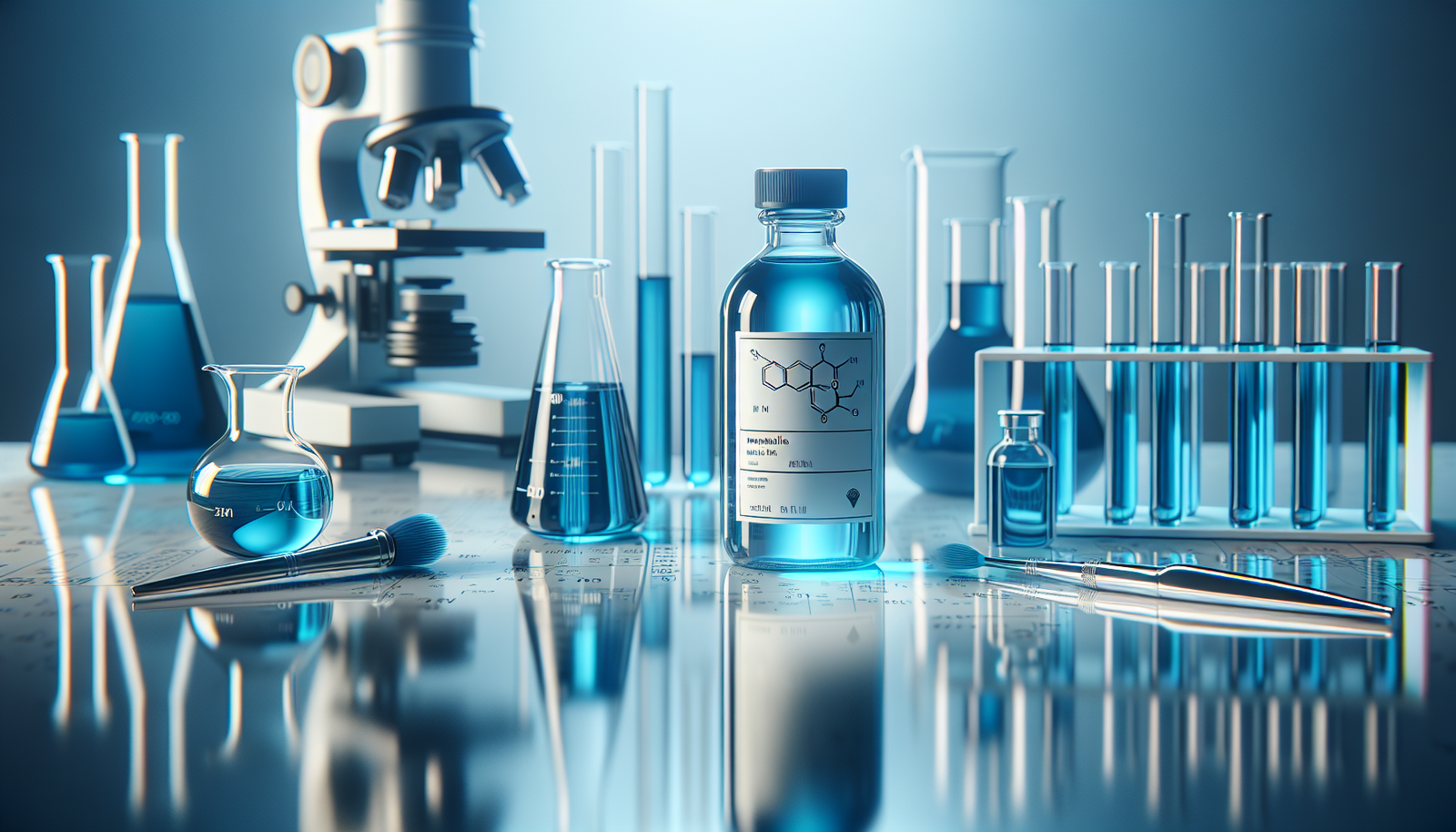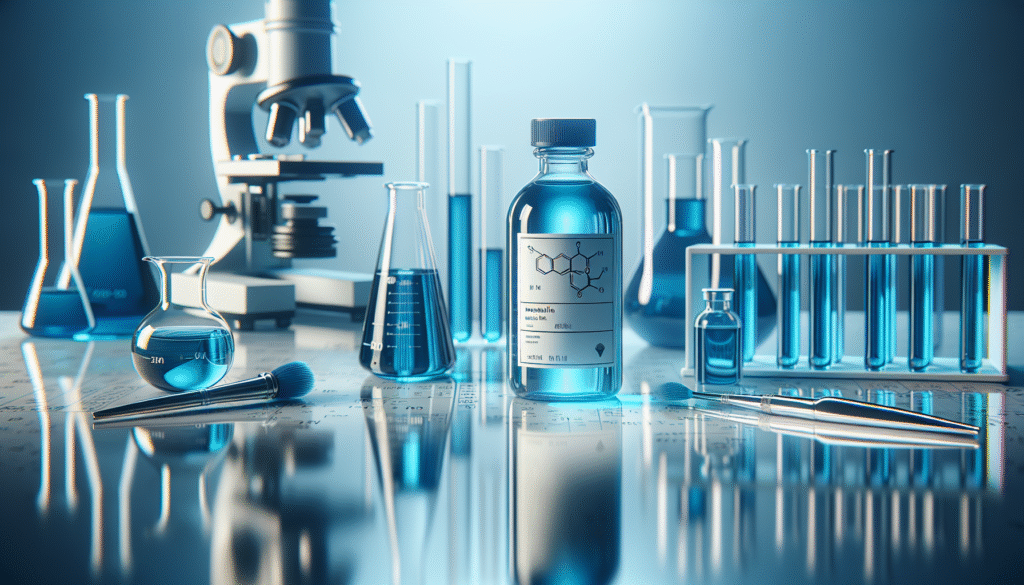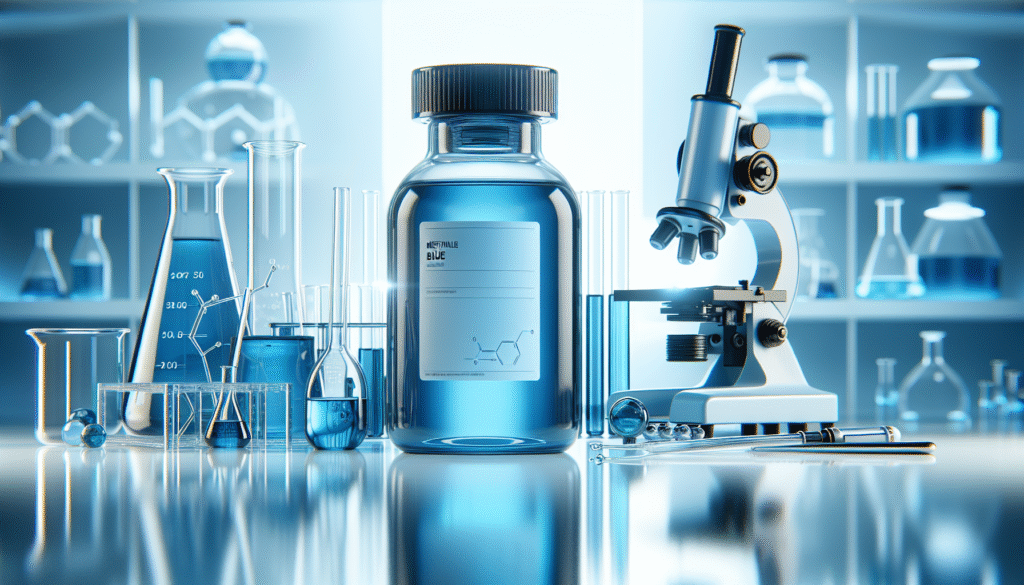
What role does the quality of laboratory reagents play in your research outcomes? For professionals in various scientific fields, the significance of using high-quality chemicals cannot be overstated, particularly when working with complex materials such as methylene blue. Methylene blue has established itself as an essential dye and laboratory reagent in disciplines like microbiology, histology, and biochemistry. The choice of brand can significantly influence your results, making it crucial to identify the top methylene blue brands suitable for laboratory use.

Understanding Methylene Blue
Methylene blue is a synthetic dye that belongs to the thiazine class of compounds. Its distinctive blue color is due to the presence of a heterocylic aromatic compound. Initially discovered in the 19th century, methylene blue has undergone extensive studies that substantiate its various applications ranging from staining biological tissues to acting as a redox indicator in analytical chemistry.
Methylene blue not only serves as a dye but also exhibits properties favorable for use as a medication—especially in cases of methemoglobinemia. However, this article focuses on its laboratory applications, where the pureness and reliability of the compound are critical.
Applications of Methylene Blue
In the laboratory setting, methylene blue is versatile, utilized for a variety of tasks:
-
Staining: One of the predominant uses of methylene blue is in staining tissue sections and live cells for microscopy. It allows for the visualization of cellular structures like nuclei and organelles.
-
Indicator in Redox Reactions: Methylene blue functions as an effective redox indicator. Its color changes in response to the oxidation state of its environment, which can be crucial in various chemical analyses.
-
Antimicrobial Properties: Certain studies demonstrate that methylene blue possesses antimicrobial properties, which can make it useful in microbiological applications.
-
Biochemical Assay: Methylene blue can interact with specific biomolecules, providing insights into metabolic processes.
Understanding these applications helps underscore the importance of selecting a high-quality brand of methylene blue, which will be explored in greater detail in the following sections.
Criteria for Selecting Methylene Blue Brands
When evaluating methylene blue brands, it is essential to adopt a systematic approach that emphasizes quality and reliability. Here are the key criteria to consider:
Purity and Certification
The purity of methylene blue is paramount. Impurities can lead to erroneous results or contamination in experiments. Opting for brands that provide certification of purity, such as analytical or laboratory-grade methylene blue, can help assure quality.
Supplier Reputation
A supplier’s reputation within the scientific community can serve as a reliable indicator of product quality. Established suppliers often have a track record of quality assurance and manufactured standards, making them a safer bet.
Availability of Technical Support
Access to technical support from the supplier can be invaluable, especially when troubleshooting or seeking specific applications. A responsive customer service team can make a significant difference in your outcomes.
Cost-Effectiveness
Considering your budget is important, but do not let cost be the sole deciding factor. While it may be tempting to select the least expensive option, higher-quality brands may ultimately save you time and money by minimizing experimental errors.
Packaging and Storage Instruction
Proper packaging not only extends the shelf life of the chemical but also ensures user safety. Clear labeling of storage instructions also helps maintain its integrity over time.
Leading Methylene Blue Brands for Laboratory Use
Here is a breakdown of some of the top methylene blue brands recognized for their reliability and performance in laboratory applications.
1. Sigma-Aldrich
One of the most reputable suppliers in the scientific community, Sigma-Aldrich, offers methylene blue that adheres to the highest standards for purity and performance.
Features:
- Purity: Analytical grade (≥ 97%)
- Applications: Staining, redox indicator
- Certification: Available on request
Why Choose Sigma-Aldrich
The credibility of Sigma-Aldrich is backed by its rigorous testing and quality control processes. You can trust their products to deliver reproducible results.
2. Thermo Fisher Scientific
Thermo Fisher is another industry leader known for providing high-quality reagents, including methylene blue.
Features:
- Purity: Laboratory grade
- Applications: Biochemical assays, microbial staining
- Support: Comprehensive technical support available
Why Choose Thermo Fisher
Thermo Fisher’s commitment to innovation and customer-focused service makes them a reliable choice for laboratory-grade reagents.
3. VWR
VWR positions itself as a comprehensive supplier of laboratory products including chemicals such as methylene blue, focusing on various sectors including academic, chemical, and life sciences.
Features:
- Purity: High purity grades
- Applications: Histological and microbiological staining
- Reputation: Well-regarded within academic institutions
Why Choose VWR
Their extensive product catalog along with expert support allows you to address specific needs efficiently and effectively.
4. Acros Organics
Acros Organics, renowned for its wide array of specialty chemicals, also offers methylene blue that is suitable for laboratory use.
Features:
- Purity: Highly pure
- Applications: Analytical chemistry and dyeing
- Sustainability: Emphasis on environmentally friendly practices
Why Choose Acros Organics
For those emphasizing sustainability without compromising on quality, Acros Organics provides a compelling option.
5. Alfa Aesar
Alfa Aesar specializes in research chemicals, metals, and materials, making their methylene blue an option worth considering.
Features:
- Purity: High purity levels (≥ 98%)
- Applications: Diverse biochemical applications
- Documentation: Comprehensive COA (Certificate of Analysis)
Why Choose Alfa Aesar
Their thorough documentation processes make order fulfillment transparent, which can enhance your confidence in the product.
6. Strem Chemicals
Strem Chemicals is recognized for its focus on rare and specialty chemicals, including high-quality methylene blue.
Features:
- Purity: Analytical grade options available
- Applications: Used in advanced research
- Customer Focus: Strong emphasis on customer relationships
Why Choose Strem Chemicals
With a focus on customer service, they ensure you get assistance tailored to your specific research needs.
How to Properly Use Methylene Blue in the Laboratory
Correct handling and application of methylene blue are essential in maximizing its efficacy and ensuring safety in your procedures.
Preparation of Methylene Blue Solutions
When preparing solutions, it’s crucial to use the correct dilution methods to achieve the desired concentration. Always refer to the manufacturer’s guidelines regarding dilution factors and methods.
Safety Considerations
Protective gear is essential when working with methylene blue. Consider the following safety measures:
- Wear gloves and goggles to prevent skin or eye contact.
- Ensure you are in a well-ventilated area to avoid inhalation of dust or vapors.
- Dispose of methylene blue waste according to your institution’s guidelines to minimize environmental impact.
Storage Guidelines
Proper storage is vital to sustain the integrity of methylene blue. Store in a cool, dry place away from direct sunlight, and ensure that the container is tightly sealed.

Common Issues and Troubleshooting
While working with methylene blue, you may encounter some challenges. Awareness of these issues can help streamline your processes.
Inconsistent Staining Results
If you find that staining results are inconsistent, consider the following:
- Solution Concentration: Verify you are using the proper concentration.
- Staining Time: Adjust the time the specimen remains in the dye.
- Sample Quality: Ensure the sample is prepared properly and free from contaminants.
Color Stability
Methylene blue can degrade when exposed to light. Store it in dark containers to minimize exposure and consult the product’s expiration date to ensure effectiveness.
Misinterpretation of Results
Ensuring that you have adequate controls in place is crucial to avoid misinterpretation. Always include positive and negative controls in your assays when possible.
Conclusion
The quality of reagents like methylene blue is a critical component in successful laboratory research. By prioritizing reputable brands like Sigma-Aldrich, Thermo Fisher Scientific, and VWR, you position yourself to achieve reliable, reproducible results. Whether you are using methylene blue for staining, as a redox indicator, or for its antimicrobial properties, the attention to quality will undoubtedly enhance your research output.
When making your purchasing decision, weigh factors such as purity, reputation, technical support, and cost-effectiveness. By adhering to best practices in preparation, safety, and storage, you can maximize the potential of methylene blue in your laboratory applications. In an ever-evolving research landscape, leveraging high-quality reagents will always be a key driver of innovation and discovery.